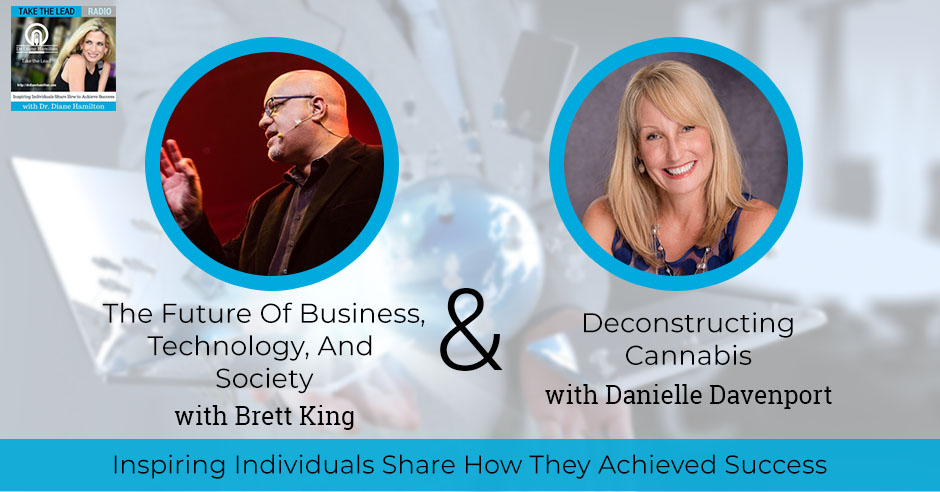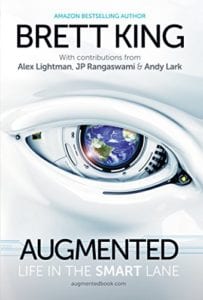
I’m so glad you joined us now because we have Brett King and Danielle Davenport here. Brett King is a world-renowned futurist and speaker, international bestselling author and media personality. He’s written so many bestselling books. Danielle Davenport is the CEO of the Global Foundry Group. She’s a global services expert focusing on cannabis. This is going to be an interesting show.
Listen to the podcast here
The Future Of Business, Technology, And Society with Brett King
I am here with Brett King who is the world-renowned futurist and speaker, an international bestselling author and a media personality who covers the future of business, technology and society. I could probably list about four paragraphs of just awards and things that Brett’s done. You probably know he’s the King of Disruptors by Banking Exchange Magazine. He was voted America’s Bankers Innovator of the Year. He’s got his own show that’s number one in Fintech called Breaking Banks. It’s in 177 countries with 6.5 million listeners. We’re adding a few to your listener base right now. It’s so nice to have you here, Brett.
I’m very happy to be on and I welcome listeners.
I could understand that. You have quite a reach. All your books were amazing. One was in the top ten in Amazon for two years. Your latest is a bestseller. It’s available in a dozen languages. The work you’ve done is amazing stuff. I loved watching you speak because you cover all the questions everybody’s thinking. You’re ahead of them. You already know what people are thinking. A lot of people right now are wondering what a futurist is for sure. That sounds like you should intuitively know what it is, but I want to know your definition.
There’s a running joke that a futurist means never being wrong now. Ultimately, a futurist is someone who looks at trends and tries to extrapolate those trends to see what will be happening in the future. The real ingredient is human behavior. How will humans respond to these changes that we get from historical precedents? We get that from looking at history and seeing similar cases in terms of how humans have responded in the past. You mash up those two things together. Essentially, I tend to look at the next 10 to 30 years in terms of major technology disruptions and then the specific impact on the industries like banking. It’s that mix of being good at history and then good at transporting.
You have made a name for yourself in this financially. I thought it was going to be all financial things that you talked about, but you go in all industries. I found that fascinating. I used to work in lending and real estate and the fact that you deal in banking and all that, I want to go that way. It’s interesting to see what’s going to happen to finance in the future. Are we going to have mobile payments? What’s changing right now in financial services?
2018 was a big year for mobile payments. China did approximately $22 trillion of mobile payments. We’re still waiting for the numbers, but that’s what we estimate. That puts the Chinese mobile payment ecosystem greater than all of the plastic card payments in the world. Officially, 2018 was the year that mobile payments overtook plastic card-based payments. We see cash declining and so forth. The real shift here is as you’ve seen with these other industries, what Amazon has done to retail, what Netflix has done to cable and what iTunes has done to the music business, etc. You see the same thing happening to banking now. Banks have romanticized the role of bank branches when you speak to many bankers.
[bctt tweet=”The real ingredient to predicting the future is human behavior.” via=”no”]Ultimately, a lot of what we do in the branch now is purely unnecessary friction. When you look at optimizing the experience of a customer and remove that friction from doing business with the customer, you ultimately get to these great digital experiences. The fact that you have to sign a piece of paper to get access to banking now is the most ludicrous element of it. Signature is not secure. It’s easily replicated. There’s a whole lot of better ways to collect data from a customer than filling out a paper application form in a bank branch.
People still write checks in front of me in line at the grocery store, which I still can’t believe people are doing that. It drives me crazy.
Two-thirds of all checks in the world are written in the United States. It is a uniquely US problem here.
Did you think that we would see more with Apple Pay than we’ve seen? What did you think of that?
I think Apple Pay is progressing well. It’s a chicken and egg problem with Apple Pay because you need a point of sale terminals that can accept contactless payments. At the same time, it’s rolling out a mobile app or a phone with NFC capability. You also have to be rolling out point-of-sale terminals and get merchants on board. There are two reasons why that hasn’t happened seamlessly. The first is that merchants don’t like paying interchange fees, which is the small fee they pay to banks and credit card companies for those types of payments. The second is there’s a cost and a physical displacement to that. The reason China has done so well on this front is they did away with that.
They started with QR codes, which were just on the phone. If you’re a merchant, as long as you had a phone, you could accept a payment. You didn’t need a point of sale terminal. As a customer, you didn’t need a plastic card. You didn’t need to go to a branch to get access to that. You just downloaded an app. That combined with the fact that Alibaba, the Amazon equivalent of China and Tencent WeChat, like Facebook to some extent here in the US, those two networks where the power behind the growth of mobile payments. In addition, you’ve got a network effect along with the lower friction of the mobile payment ecosystem.

It’s interesting to see all the different things that have come up. You mentioned QR codes. There’s Square. There are all these different things that people have used to make it simpler. Yet you talked about disruption and how we can prepare for the future. We can’t do that unless we see it as a problem. That was interesting to me because I’m dealing with curiosity and I want people to recognize the problems to be able to come up with solutions. How do we get people to think like that? How do we have them see the things as problems so that they want to fix it?
That’s the interesting part of the psychology around technology. When you look at what’s happening in the United States and the UK now with the Trump movement and Brexit as an example. There are a lot of correlations between this resistance to globalization and resistance to technology change historically. A lot of it has to do with when we feel our culture is under threat. It’s that yin and yang. If you can get past that fear of change, that will excite or interest your curiosity. That’s tough because at the end of the day if someone’s in a job like in 1812. If you’re in a factory weaving textiles and the steam machine was threatening to take your job, you’d be pretty fearful of that, “What am I going to do next?”
Now, when we talked about Trans-Continental truck drivers in the US are being threatened by autonomous vehicles and things, it’s very much the same. What is clear though is that that rate of technological shift or disruption has been speeding up in the last few decades. Unless you’ve got that curiosity, unless you’ve got that hunger to learn, then it’s highly likely you’re going to be displaced. That’s where the difference is. Are you excited about the future? Are you prepared to learn and adapt to that future? Are you excited by the opportunities that are forge? Do you wish things went back to the way they were and things would remain static? I don’t think it’s that remaining static necessarily but I want to feel safe and I want to feel like I know what’s going on. If the rules are changing, that uncertainty, that unpredictability is an issue.
In my research in curiosity, I found four factors that keep people from being curious. Fear is the biggest one, then assumptions, technology and environment were the four factors that I found. You have to recognize that this is a problem so that you can embrace the change. Otherwise, you’re going to stay the same. You made a comment in one of your talks that in 250 years how many companies have successfully defended their business model against technology and you say the answer is none.
If you were to look at that historically and statistically, you’d have to say, “Why am I bothering? Why am I beating this dead horse?” Ultimately, we have that historical pattern. When you look at the dot-com and when it started to emerge, the eCommerce trends, it took a bit of time to understand how disruptive eCommerce would be. Once it was vetted in, that’s what I find ironic is when you have an industry like the banking industry or right now, the medical industry with sensors and artificial intelligence is going through this. Yet there’s this collective denial. People are still going to want to go to a branch. People aren’t going to trust a heart rate monitor on a smartwatch to tell them that they’ve got a hot problem. They’re going to want to see a human. I find that amusing that we resist that change but it’s inevitable.
I don’t resist the medical. I was a pharmaceutical rep for fifteen years and I liked the less variability of the human factor from what I saw on the backside there. A lot of people think that they’re getting human, that they’re going to get something better maybe somehow because that’s what they’ve always had. They get worried about robots. We’re going to have terminators and all this stuff eventually. I think the planet is worried about some of this stuff. They’re thinking about what’s going to happen. We worried always. In ‘80, ‘85 or whatever, I was selling System/36 and 38 with IBM and different things.
[bctt tweet=”Signature is not secure. It’s easily replicated.” via=”no”]Everybody was worried that their jobs were going to be taken over by these computers. Then there were computer operators that were created that new jobs come out of it. Then it was Moore’s law and everything else. Everything’s compounding and everything’s exponential or whatever the term is for how much more we’re getting now of computers can run the computers. Is there more of a fear of losing your job now because there aren’t going to be as many opportunities? Are we going to just create products that we don’t even need but we want, so those will create jobs or is it going to be something else?
My last book before Bank 4.0 was the one I published in December. The last book before that was Augmented, it was out in 2015 and in there, I shared some research that essentially showed that if you poll the futurist, half of them think it’s going in this new age of abundance and half of them think it’s going to be dystopian and chaotic because of job technology based on employment and so forth. There is no agreement on this among the futurist community. I will give you the basics of my thinking around this. If you look historically when the industrial revolution came along, despite the fact that for example, tractors, combustion engines, displaced millions of workers on American farms, it created jobs through the model T Ford production line and so forth that took up that shift. You went from about 70% of the US labor force involved in agriculture in the 1850s and now, they’re 1.6%. There’s that continual structural change.
Being in it for every job that it destroyed, McKinsey estimated it created around to new jobs. There was a net gain in respect of the internet. The shifts with AI and software though, it needs to be seen a little bit more gradually in the context of the markets and how the markets are working in productivity and so forth. The key there is we’re seeing a change in the supply and demand curve, the basic component of economics. Traditionally, if you wanted to create more labor, the way you would do that is you’d stimulate demand. In order to respond to demand, you create supply and that supply resulted in increased labor participation.
When you’ve got software as the basis of an economy, AI and software. Once you create that software, it can essentially meet infinite demand without an additional labor force. There are some upfront labor injections, but once the AI or the software is out there, there’s minimal a response to the demand curve. That’s the structural change that’s occurring. If you look at the top five companies on the US stocks exchange now, the technology companies. Four of the top five in China are technology companies. The fastest growing biggest companies in the world now are based on technology, but they generate returns and profits with far less employees than the old industrials. The old oil and gas companies, resources companies and so forth. We’ve seen companies like GE and so forth become less relevant over time as a result of this stuff to change. That’s the challenge.
I attended Forbes Summit once in the Midwest where they were talking about how this used to be what Silicon Valley was. Then now you don’t think of it that way when things were more cars and it was the focus. Now, we’re talking about robots and different things taking over and we’re going to see more delivery robots or whatever we’re seeing. Did you say that by 2035, there are going to be more robots on the planet than humans?

That’s what curve is telling us right now in terms of the growth of robots. Robots include industrial robots working in factories, autonomous vehicles, delivery robots, autonomous drones and so forth. There are a lot of variations of robots. Certainly, if I’m going to give you one tip. I’d say based on that data, be kind to robots, you never know what’s going to happen in the future.
That’s probably a wise advice. I have an echo near me and I’m thinking voice-based data assistance is going to be big. I don’t want to say her name. Do you think that this is going to make a big difference in how we do things through voice in the next ten whatever years? Where does the voice technology going to hit us?
I talked about four major disruptors in Augmented. Artificial intelligence and robotics is a subset of that. Embedded technologies of which voice is one and I’ll come back to that. Help tech and gene therapy number three and then smart infrastructure. This is combining all of the technologies into smarter economies and systems. The two biggest personal technologies that we’ll see impact us over the next ten years, the first is voice-based artificial intelligence, personal assistance based in these smart speaker systems and so forth. Alexa, Siri and so forth now becomes smarter and more in tune with you personally. They’ll get to know your likes and dislikes and start to tailor the services around you. It’s going to be pretty interesting.
Probably around the middle of next decade will be the aerospatial computing. Augmented reality and mixed reality glasses with a computer that enables to put a display in your field of view. You won’t need a computer screen. You just wear the smart glasses, you’ll be able to see these data in your field of view. You combine these two technologies and the big shift is that computing tends to be embedded in the world around us. This intelligence is going to be available to us 24/7 when and where we need it. You won’t need a keyboard or a mouse or anything like that to interact with these technologies that will be voice and gesture-based and very easy to use.
All the things like glasses were interesting to me. My father is born with 2% vision, so he’s blind and I’ve had several guests on my show who’ve been on, Erik Weihenmayer and different other guests who’ve told me about some of the technologies that they have where they can wear glasses and someone will tell them where to go based on the thing in their ear or whatever. When you’re putting things on your eyes, it almost comes to mind the movie, The Jerk, where they ended up cross-eyed. I don’t know if you remember this Steve Martin movie, but he’s got this thing he puts on the bridge of his nose and it makes him cross-eyed. I always wonder what the end result will be. Maybe it’s because I teach ethics and technology class where we talk about what the impact some of these technologies are going to be. I know there’s gene editing and CRISPR, some of these things. What do you think about the ethics of editing out genes and bugs in our genes? I often wonder if my dad had had his eyesight fixed. I probably wouldn’t be here, but it’s interesting.
There are real ethical challenges to this, not only a gene therapy and some of the technologies we were using there but also integrating man and machine. For example, robot prosthesis. Robot prosthetics are great when you’re talking about someone who’s lost a limb or for your father for example. If we could develop a camera that could feed images directly to his optic nerve or something like that, you’d say that’s a no-brainer to incorporate that. What happens when the artificial arm gets more capable than a natural human arm and someone wants to make the decision to amputate their natural limb that they were born with to upgrade with robotics? At some point in human history, we’re going to have to deal with this.
On the ethics of gene therapy, you can say eliminating the disease from someone’s genome, like my father has a Parkinsonism, that’s a form of Parkinson’s in Australia. We know that’s a genetic disorder now. We could eliminate that. Rather than him being treated with all these different drugs to mask the symptoms of Parkinson’s, why don’t just get rid of the disease itself from the genome? That seems a fairly good value proposition and fairly straight forward. What if you want to enhance intelligence, change someone’s eye color or skin color or something like that through gene therapy? That starts to get into the gray area. We then have to deal with the ethics of a lot of this. One thing that’s missing in society right now and because it’s so difficult to do is some ethical boards or constructs that can codify human ethics. The problem is if you look at the US and other countries as well, if you got a hundred people in a room, you get real tribal divisions around ethics and so it’s hard.
[bctt tweet=”Unless you’ve got that curiosity, unless you’ve got that hunger to learn, then it’s highly likely you’re going to be displaced.” via=”no”]That’s why I love teaching ethics. The subjectivity of it is fascinating to me to get everybody discussing it. We talked about the Gattaca Future. Do you want everybody to all look this perfect certain way and then what happens? What if we slice something out that we needed and you don’t know until later. All of that fascinates. I think that the medical industry creating these organs and things are not that different than taking medication. It’s all perception of how you want to solve a problem. It makes for interesting discussions and what you do must be fascinating to study all this.
I have a lot of people on my show who want to talk about innovation and having companies become more innovative thinkers. That’s what I’m trying to do with curiosity is get people thinking and fighting those four factors that stop the curiosity problem. There are so many industries that are going to be impacted. You always hear about the trucking industry and then all the diners along the road that feed the truckers and all the different things. What do you see are the solutions for entire industries like that to get them proactively preparing to do something else?
There are opportunities to change your business model to some extent. If you take the gas stations along the major highway routes. Retooling with supercharges is the first step at still getting people with electric vehicles coming along to those locations. Once you have those vehicles autonomous, what are the opportunities? Maybe you could have a subscription service link to the vehicle where you could offer them a confectionery food drinks and that stuff. You could put it in an autonomous car. When the autonomous car goes and picks them up, their favorite snack is already in the vehicle and things like that. There are ways to adapt.
The reality is I don’t know if you should waste a lot of time complaining about this future state that is coming at you like, “What are we going to do about the truck drivers?” I think it’s far better to stop preparing for that because as history shows you can delay those changes, but you can never stop them. Curiosity is closely aligned with our need to be more long term looking in terms of our vision as a society. We wouldn’t have the problem with climate change if we were so short-term in our focus. We know that would be absolved. The quarterly earnings report for companies is a real inhibitor to innovation in many instances. This short-term-ism is also tied up with that. That’s a core part of human psychology which is an issue.
Have you written that book yet, short-term-ism? With all the books you’ve written, it’s a good idea.

I’m working on a sequel to Augmented, it’s called The Rise of Techno Socialism.
What are you going to cover exactly? Can you give a little more of what’s going to be in there?
Here’s my assumption. I don’t want to give too much of it because I want people to read the book. My assumption is that as technology companies come to dominate the stock market and they pull greater and greater pools of wealth and as AI starts to displace people from employment, there will be social pressure to more equitably distribute some of those massive pools of cash that these technology companies are absorbing. One of two things will happen. Either the government will start to tax robotics and AI and things like that such that it provides revenue for social net or those structural changes in employment. In an environment like the US where that’s politically untenable in the medium term, I think many of those companies will proactively create programs. Just like we’re seeing with Microsoft and Salesforce putting money into housing for homeless people because of the gentrification of the neighborhoods where they work. I think that these big culprits will understand that it’s in their best interest to be more socially aware with respect to the changes that technology’s bringing on society. It’s a bit of a strategic roadmap and plan of how we could orderly move into a more equitable world based on these changes.
All the things you talked about are fascinating and I know a lot of people want to follow your work. I was so excited to talk to you because I’m thinking this is so important. I’d like more people to think like you think to be able to have the foresight and be proactive to change and prepare for all these things. I appreciate your focusing on curiosity for my sake, just because it is so important to develop that. I think so many people can learn from you. I know they’re probably wanting to know more about how they can listen to your show, how they can read your books, how they can follow your speaking. Can you share how they can get in contact with you or follow you?
I’m all over social media. I’m pretty much on every social media channel out there. I’m @BrettKing on Twitter. My personal website is BrettKing.com. They can follow and they can see what I’m doing with my startup in New York, my books and the radio show, Breaking Banks, and my work on various boards around the world.
Brett, thank you so much. I enjoyed having you on the show. This has been so fascinating. I’m sure everybody’s interested to see what’s going to happen and you definitely have a lot of insight into that. Thank you so much for sharing.
You’re welcome. Thanks for having me on.
Deconstructing Cannabis with Danielle Davenport
I am here with Danielle Davenport who is the CEO of the Global Foundry Group, a global professional services firm focused on cannabis, agricultural businesses and other verticals. She’s also the Founder and Board Member of South Valley Angels in the Silicon Valley. It’s so nice to have you here, Danielle.
Thank you so much, Diane. I appreciate it.
This is an interesting topic. I have to say, this is the first time we’ve chatted about cannabis on the show and I don’t know why. It just happens to be because it’s such a huge topic. There’s a lot of hype around it. I’d like to know what got you interested in this and just a little background about you.
I pretty much have been in cannabis my whole life and I say that because my parents were hippies and I grew up around it. I grew up learning how to sex the plants, which means taking the males out because the females are what you want, learning how to trim them and do all that stuff. I’ve never been into it though. I’ve never been a user and you know how you always want to be the exact opposite of your parents. I went the exact opposite route and majored in economics and computer science and did the mainstream route. I’ve come back full circle. What’s interesting about this is I started doing some agricultural consulting. Some of the AgTech precision drip systems, how to optimize crops in yields and things like that.
Years ago, it was a natural progression for a lot of the farmers that wanted to switch over their crops or people that were getting into it. They were using the same tools and technology that traditional agriculture is using. I slowly started consulting a bit more in the cannabis space and that area has just taken off. I fell back into it, kicking and screaming a little bit. It’s been a great ride. What I mean by that as well is not anybody can be in this industry, because there is a huge black market still. There’s a huge gray market and then there are the people that are rising above the surface and struggling to survive. With that, you have to have a little bit of street cred to be able to talk to the million-plus dollar investors. Then also be able to talk to the growers that are coming out of the black market that is just scared and maybe skeptical. They are used to operating on handshakes and then having a shotgun at their side.
It is an interesting industry. You said a couple of things. I didn’t know anything about the female thing. That’s interesting. Why don’t you want the male plant? You don’t smoke the male plants.
[bctt tweet=”You can delay changes, but you can never stop them.” via=”no”]You pull the male plants out so the females will grow. That’s where the buds come from. If you’re growing to get the THC and to get high. Hemp is a little bit different and hemp as we know just been legalized federally in the Farm Bill that was just passed. That’s a little bit different of a story. You have to know what you’re doing if you’re going to grow and cultivate.
I’ve seen a lot of the oils lately that don’t have the THC. I’ve seen them for pain relief and all that thing. If you use those things you don’t get the effects. How does that work that it helped pain if it doesn’t have that part to it?
Since I’ve been in the industry, I’ve been around it for a long time. I have a unique perspective. Also, I’ve finished my book. For that book, I did so much research. With that, I recognized and realized that we have cannabinoid receptors across our whole body. Cannabinoid, the short-term, the acronym is CBD and that’s what everyone hears about. We have cannabinoid receptors in our skin, in our mouth, in all of our internal systems and everywhere. If you think about serotonin and melatonin receptors in our brain, we have this exact same thing for cannabinoids all over our body. You don’t need the THC, it’s the cannabinoid that is in the hemp plant or whatever you’re growing. It could even be something with THC in it. Your body is built to take that in and it helps us maintain homeostasis. It helps us maintain health in everything we do.
Why we’re missing it now in our bodies and why we’re having to add it in like all our multivitamins, I’m looking at it like a multivitamin that we needed to supplement that we’ve been missing, is there are over about 3,000 different products made with hemp. That’s everything from baskets to cups to rope to clothing, everything. Back hundreds of years ago, hemp was a staple crop and that’s what they used to make potentially your earthenware that you’re going to use to eat soup out of. It might have been something that you made some clothing out of. Since we have cannabinoid receptors in our skin, in our body, we were getting it naturally because we were wearing it. We were using ropes that had it. There were different ways that we were always getting it in our system so that we have that homeostatic level of vitality. Now, we’re having to add it back in because we don’t have it anymore. We have polyester.
Was it Woody Harrelson who made so much point about hemp? I always can’t remember or Matthew McConaughey. One of them had made hemp a focus on it for a while. It’s interesting to see the legalization of marijuana or whatever they’re doing in different areas. I’ve been to Colorado since they did it and some different areas. I grew up in the ‘60s, I remember in the back of my mind the smell and it seems like it smells different now. Are they making something different than what we grew up with in the ‘60s? It has a skunky smell to it when you walk around the town like, “What is that smell? It didn’t seem familiar at all.”
There are so many different strains. There are so many different types. Now, we’re learning more and more and we’re able to hone in on the different strain that does different things. Before you get skunk weed. It was a bunch of shake and a bunch of stocks and everything in a baggie. It was much different. It’s whatever you could get. Maybe it was a lower grade or who knows? Now, we can target it and say, “I want one that’s great for calming me down and so I’m going to go buy that one. I want one that’s going to make me focus so I can practice my guitar better,” or do whatever and they’ll go buy that one. We’re fine-tuning our understanding of all the different strains as well.

I’ve never understood the appeal of wanting to eat and go to sleep. It’s never something that I ever wanted to do. Are there strands that don’t increase hunger, that don’t make you want to sleep, that don’t make you wonder if I said that?
Yes, and that’s why you would go into a dispensary and hopefully talk to a very educated budtender. The budtender would say, “Is it anxiety? Is it pain? What is it that you need it for? Is it sleep?” Those are the three main things that CBD is good for and marijuana in general. You would say, “I have extreme anxiety and I just can never come off that little edge.” They would tell you which strain would be great for that. I always said when I was in high school and I’ll never admit this if I run for office, but I smoked pot when I was in high school. Apparently, I smoked the strain that made me eat 500 Reese’s Peanut Butter Cups. I never wanted to have that one again.
That’s how I view it. It seems like something that would just make you want to eat and go to sleep or even just not be motivated to do anything. Do they have strains that don’t make you just want to watch the faucet drip all night?
Yes, and fine-tune your brain a little bit. Some people can focus better. It’s great for people with ADD. It’s being used for so many things right now. The elderly are seeing amazing benefits from pain. One of the biggest problems that I have right now in the industry is it’s so nascent and so young that we haven’t dialed in the testing and the quality. There are a lot of snake oils out there. People are claiming that they have things and they can falsify documents and whatever. Then you’re putting it in, you just don’t know the potency or the validity of it. That’s a little bit frustrating now.
I’m surprised they don’t. They regulate so much with the FDA and everything else.
It’s not federally legal. Municipalities have the authority and then it’s up to each state to identify what those rules and regulations are. That’s what I do. I also go out and I consult with cities that are getting ready to go online. They’ve just voted it in and they’re thinking, “How do we do this?” What does it look like from planning permit perspective? What does it look like from having a retail space? Should we be out there educating parents and teens? What exactly should we be doing? Also, a lot of farmers are thinking, “Should I convert my crops to hemp?” That’s a huge opportunity because the price you can get for hemp versus alfalfa or grass hay or something is exponential.
[bctt tweet=”You have to know what you’re doing if you’re going to grow and cultivate.” via=”no”]I used to work in agriculture chemicals and I’m thinking of the different crops and what they would do. We never dealt with any of this back then. As you’re talking about all these different things you can do with it, it brings to mind that television show Weeds and all the different things she cooked and baked. Is that what it’s like? You would just go into a store and I want these cupcakes and I want this cookie. Is it like that or is that overly exaggerated?
You can go in and get essentially in any medium you want, a topical, an edible, a tincture, whatever it is, you can get it based on what you need. That’s the other thing is and I’m just going to bring it back a little bit to my book, is that I’ve put it into a few stages and we’re in the chaos stage. What I mean by that is there are so many new entrants into the industry that it’s flooded with options and not all are going to survive, that’s for sure. Since you’re flooded with options, there’s confusion. There’s a lack of clarity and validity of what’s in it. All of those things that we’re having a struggle with. I tell people, if they’re going to get a CBD product or something out there, go based on potentially recommendations or a website that said, “I’ve used this for three years and this is amazing.” Look at recommendations that people have used something for a very long time. They can give you that credibility that you need. We can go through all the testing we want, but someone can claim to have nanotized water and it’s a sports drink or something and it isn’t really nanotized water. They just bought some water that someone shook up in a plastic bottle and sold it to them as that. No one’s testing for nanotized water.
You’ve mentioned your book and it’s Cannabis Inc. Is that the name of the title?
The title’s Cannabis Inc. and the subtitle is From Compassion to Consolidation. What I’ve done is I’ve broken it down into a good history of cannabis. I talked a little bit about all the different products of hemp and how it was used by emperors. It’s been a staple of our lives for so long. During the war times, it was used for uniforms, everything. Breaking down the past and how more recently, like in the ‘60s, ‘70s and ‘80s when it was medical and medicinally more focused, it was a compassion component to cannabis. People that would grow it would essentially give away half of their crops to people that were dying of AIDS. There is a huge compassion component in this and they would distribute it to the elderly or do whatever.
Now, they’re so over regulated and everything costs so much that the compassion piece is getting lost because all the vultures are coming in. All the people that they’re like, “It’s going to be a huge industry, billions of dollars, I’m in.” They’re not thinking about the people that need it and now they can’t pay those exorbitant prices. That’s the compassion component. Then we grow into the next stage, which I think we’re in now, which is chaos. Complete chaos in the industry because every state’s on its own. Every municipality is on its own. There are so many new entrants. The regulation is just scattershot. What we’re starting to see is a little bit more competitive advantage. That’s the next stage, which is we’re starting to call through a lot of the poor players and bad performers and people that don’t have that competitive advantage. There’s going to be mass consolidation. I anticipate mass consolidation being in about seven to ten years. That means we’re going to have, pharmaceutical, big tobacco, big alcohol. They’re going to take over the industry or some of the big players as well.
Now that you bring up alcohol. I grew up in the ‘60s and ‘70s. They’ve made us watch, if you smoke pot or you did this or that, you’re going to see big pink elephants and you’re going to see scared straight movies and all the things. How does this compare to it was always the gateway drug and then they compared it and made it worse than alcohol and then can you drive on this stuff? Can you address some of that that people are worried about?

I don’t have the stats in front of me, but in terms of the number of deaths from alcohol per year, we know that’s high. There’s been no death attributed to marijuana, specifically overdose or anything like that. Maybe someone got a bad batch and went a bit cuckoo. Maybe it was laced with something or whatever. Then again, it hasn’t been federally studied and that hasn’t been monitored so it’s hard to prove that. There are no hospital reports that say this guy or gal was found overdosed on smoking too much weed. If anything, they’ve just gone a bit giggly and watched Scooby-Doo all night. That’s about as much as they’ve done. It’s funny I was talking with a guy at an event that I was speaking at.
I told these little vignette stories because I think they’re hilarious. I was at an event and he goes, “I’ve never been into marijuana but I was in a fraternity.” He goes, “All the fraternity guys that drank would hang out downstairs and all the guys upstairs laugh and watch Scooby-Doo and it was totally chill and did nothing. They were smokers. He goes, “Downstairs, after the party on a Friday night, the house was trashed. People were beaten up. There were throw ups everywhere, whatever.” He’s like, “I realized I should be hanging out upstairs, not downstairs.”
That makes me wonder about the ambition and drive that it gives you. I don’t want them to beat each other up, but I want them to do something other than watch Scooby-Doo.
You need to pick a strain that’s not going to make you comatose. We know that now. We know which one will do that.
When you sent me a note about this originally, you said that you think that this is going to be a woman’s industry. I wonder what you meant by that? How do you see this as a woman’s industry?
It’s a new industry. There’s not that entrenched good old boy none sense. Since it’s so new and I think the companies that are going to have the staying power and the ones that are going to survive are going to be the ones that understand holistic medicine, that understand compassion, that understand business and being competitive and having an advantage. Also, understanding I’m being a rock star in terms of marketing and just going after big business. I think the companies that potentially could be acquired or the people that are going to make their name in this industry are going to be women. I’m excited about that. If you look at women starting companies in cannabis, the percentage is much higher. The number of women getting funded is much higher. Overall, it’s a great industry for women to be in.
[bctt tweet=”Anxiety, pain, and sleeping problems are the three main things that CBD is good for.” via=”no”]Do you think that they may fear the reputation? When you said, “If I run for office, I’ll deny this.” Is there still the fear of being associated?
Women are more confident about that too. I’m not judging men, but men are usually a little bit more ego-driven. Women are more like, “I know this helped my friend.” They can tap into that like, “I know this.” How many women are telling their men to try this holistic whatever or try this ointment or put sunscreen, because men just don’t do it? We recognize that there are different things that are good for us and we’ll jump on that bandwagon much quicker. We’re early adopters in that stuff and everything.
If someone’s reading this and they were thinking about investing or getting into the industry, how do they do that?
It’s tricky now because it’s hard to find companies that are on the start market and you can invest that way, but there are some that are doing very well. If you were potentially an Angel investor or you wanted to just plop some money into a company. I talked about the competitive advantage and mass consolidation. It’s a losing game. It’s a zero-sum game right now. Nobody is making a profit in cannabis right now unless they’re huge conglomerates like in Canada. Most companies I know are running at a loss. The reason for that is because the cost of compliance is so high. Taxes are so high because everyone thinks that it’s a huge cash cow that they are taxing of it and no one’s making money. It’s a loss leader right now.
If you stick with a company that has a winning strategy, then there’s a huge potential for upside. What I mean by that is that strategy should be this, and this is purely my opinion but based on a lot of research. We’re going to be going federal fairly soon. I say maybe three, four or five years. When we go federal, there’s going to be a lot of FDA rules and regulations that are going to be blanketed across the state. If you can start pre-empting those standards and start to think about what those standards are going to be being pharmaceutical grade and medical grade. You start putting those processes and standard operating procedures and everything into your systems at your company, you’re going to be primed for success.
It is foresight with proactive thinking. That makes sense.

People aren’t thinking about that whole value chain. I use maybe some of the same stories over and over again, but a lot of growers are using CO2 to increase the yield. The majority of CO2 comes from fracking. What do we know about fracking? Carcinogenic. If something was going to be tested that may potentially have carcinogenic in it. You might want to think about not doing CO2 from fracking. There are different things to be considering as you’re going through the whole evolution from seed to sale. The better we can get at making it a pharmaceutical grade, taking any residual poisonous substance out or anything like that, the better off you’re going to be.
Having worked in agricultural chemicals and then pharmaceuticals, once the FDA gets involved in something, that’s going to get rid a lot of players. The time it takes to go through. I’m trying to remember what percentage of our products even made it through research. Then everybody’s charging high amounts for their drugs because they lost all the money and all the research that didn’t get through. Do you foresee all those small companies going away and just being large like pharmaceutical companies taking over for this?
We already see Jim Beam getting in. We already see large alcohol companies recognizing that this is their competition now. There are a lot of bars opening up that are just for cannabis. It’s a huge disruptor. The pharmaceutical industry is definitely priming themselves for it. The alcohol, tobacco and then there are also major conglomerates that maybe are starting to gobble different companies up. They’re going to have that economy of scale to grow.
Is it going to be considered a food or a drug?
It depends on what the purpose is. If it’s the CBD and you’re trying to sell it as a medicinal grade something and what you’re targeting it towards, then it’s going to have to be a drug.
I’m curious about what the laws are going to be, what level you could have for driving and all that. Is that all been addressed yet?
No, and there’s not good testing mechanisms too. I have teenage daughters and there’s cannabis everywhere. How do I know that they get and take an edible at school? Before we’re just able to sniff each other. Like you said, it skunks.
It’s starting to stink in these towns now like this skunky smell. I’m in California or Colorado, I’m like, “It’s a horrible smell,” when you’re in parking lots or wherever people are hanging out. I never liked to even be around when someone’s smoking a pipe. Is everything starts to stink is the thing I’m worried about.
I hope not because the biggest market right now is in edibles and tinctures and stuff. Not many people and I’m learning the lingo, it’s new now but apparently, you roll a blunt, you don’t roll a joint anymore. Not many people do that anymore. The people new to it are the ones that are doing the gummies or the tinctures or the edibles.
This is all so interesting and I hope your book does well. It’s a very timely topic and I’m sure a lot of people are very interested in finding out how they can get Cannabis Inc., your book or find out more about you. Is there some website or something you want to share?
I don’t have a website but I am on LinkedIn and I’m more than happy to connect with anybody that connects with me on LinkedIn. It’s Danielle Davenport and I’m in the Silicon Valley area. Connect with me and then I’ll have more information about my book and when it’s going to be published. It’s going through final edits right now and it’ll be available on Amazon books on demand. I’m excited just because the book is targeted for people that want to understand the background of the industry. What the current state is and where it’s going. I almost see it as a textbook that could be potentially used in colleges and classes because it talks about mergers and acquisitions and the industry and history. It’s for investors and it’s for people just scratching their head going, “What’s all this about?”
It’s been interesting and I’m so glad that you were able to share all this on the show. Thank you so much for joining me.
Thank you. This was fun. I appreciate it.
I’d like to thank Brett and Danielle for being on my show. We get so many great guests. To find out more about cracking the Curiosity Code, you can go to CuriosityCode.com. I hope you join us for the next episode of Take The Lead Radio.
Important Links:
- Brett King
- Breaking Banks
- Apple Pay
- Bank 4.0
- Augmented
- Erik Weihenmayer – Previous episode
- @BrettKing – Twitter
- BrettKing.com
- Global Foundry Group
- South Valley Angels
- Danielle Davenport – LinkedIn
- CuriosityCode.com
About Brett King

Brett King is a world-renowned futurist and speaker, an International Bestselling Author, and a media personality who covers the future of business, technology and society. President Xi Jinping cited his book Augmented on the topic of Artificial Intelligence. He has spoken in over 50 countries, at TED conferences, given opening keynotes for Wired, Techsauce, Singularity University, Web Summit, The Economist, IBM’s World of Watson, CES, SIBOS and many more. He has appeared as a commentator on CNBC, BBC, ABC, Fox, and Bloomberg. He previously advised the Obama administration on Fintech policy and advises regulators and bank boards around the world on technology transformation.
King hosts the world’s first and #1 ranked radio show on FinTech called “Breaking Banks” (177 countries, 6.5 million listeners). He is the CEO and Founder of Moven, a successful mobile start-up, which has raised over US$47 million to date, with the world’s first mobile, downloadable bank account, available in the United States, Canada, UK, Indonesia, Russia, and New Zealand.
About Danielle Davenport
 Danielle Davenport is the CEO of the Foundry Group, a global professional services firm focused on Cannabis, agricultural businesses, and other verticals. She is the founder and board member of South Valley Angels in Silicon Valley. A key thinker and contributor in the identification, launch and scale of several agro & technology start-ups, operations and GTM models. Currently, CEO of The Foundry Group, a global professional services firm focused on Cannabis, Agro-Biz, and other verticals. C-Suite Executive with proven success in Seed to Enterprise Scale Transformations, Leadership, Strategy, Operations, Budgets and Merge/Integrations. Technology/Innovation connector, communicator and accomplished member of Global Speakers Bureau.
Danielle Davenport is the CEO of the Foundry Group, a global professional services firm focused on Cannabis, agricultural businesses, and other verticals. She is the founder and board member of South Valley Angels in Silicon Valley. A key thinker and contributor in the identification, launch and scale of several agro & technology start-ups, operations and GTM models. Currently, CEO of The Foundry Group, a global professional services firm focused on Cannabis, Agro-Biz, and other verticals. C-Suite Executive with proven success in Seed to Enterprise Scale Transformations, Leadership, Strategy, Operations, Budgets and Merge/Integrations. Technology/Innovation connector, communicator and accomplished member of Global Speakers Bureau.